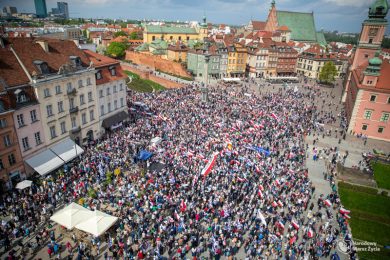By Kurt Jensen | OSV News
(OSV News) — The annual New York Encounter weekend is renowned for including the widest range of thinking possible.
From Feb. 17-19, the event, with its usual discussions of literature, art and theology connecting faith and culture, combined a warm appreciation of the late Pope Benedict XVI with an exhibit explaining 19th-century German philosopher and polemicist Friedrich Nietzsche, who is famously remembered for his statement “God is dead” in which he denounced Europe’s Christians as having rendered belief in God as unworthy of belief.
With the theme of “Who Am I That You Should Care For Me?” discussions focused on the human need for connection. Pope Benedict, renowned for his scholarship, fit easily into that.
“People went to Rome to see Pope John Paul II, but they went to hear Pope Benedict XVI,” Cardinal Seán P. O’Malley of Boston said Feb. 17 at the event, which was held in person and livestreamed. “His homilies will inspire people for generations to come.”

New York Encounter is sponsored by the Catholic lay movement Communion and Liberation. Father Luigi Giussani, the Italian priest and educator who founded the Communion and Liberation movement — originally for students — in the 1950s in Milan, died in 2005. His cause for canonization officially opened in 2012, giving him the title “Servant of God.”
Communion and Liberation, which stresses the “experience” of one’s encounter with Jesus Christ and a subsequent transformation into developing a public purpose, was a particular favorite of Pope Benedict, who celebrated Giussani’s funeral Mass. Pope Benedict died Dec. 31 in Rome.
Pope Benedict, Cardinal O’Malley said, “was always clear. Christianity is not just an idea or a moral code, but an encounter (with Jesus Christ).”
Steven Brown, dean of graduate studies at The Catholic University of America in Washington, said that for Pope Benedict, “the hardening of our hearts is not a moral problem, but a problem of our concept of reason.”
To that end, Catholic identity is not so much about a moral code, but “about making all that you do vibrate in the ecclesiastical life of faith,” Brown said.
Father Alex Zenthoefer, rector of St. Benedict Cathedral in Evansville, Indiana, praised Pope Benedict for having “one of the most brilliant theological minds” and said his reputation as “God’s Rottweiler,” a label attached to him when he led what was then called the Congregation for the Doctrine of the Faith, obscured the pope’s gentle demeanor and capacity for personal kindness.
Cardinal O’Malley said the pope, who wrote 66 books, could dictate extemporaneously a book of theology without need of corrections; while Father Zenthoefer noted that Pope Benedict “could access those levels of reality we take for granted,” and that his “childlike demeanor” with his faith scholarship “put him in front of reality in this way.”
That acceptance of reality factored into Pope Benedict’s decision to resign his papacy in 2013. His retirement was “not something that many clergy dealt with well,” Father Zenthoefer observed, but there was “tremendous freedom” in the pope acknowledging, “The church needs someone else at this moment, and it’s not me.”
In a Feb. 18 discussion of a new translation of Father Giussani’s 1986 book “The Religious Sense,” Father Michael Carvill, the North American coordinator of Communion and Liberation, praised Father Giussani’s message of “anything is possible,” which he said “removes the shadow over the whole human experience.”
“There’s months in which you get lost in the small stuff,” he said. “But then there’s a work here that is, to me, extremely helpful and valuable to me in my personal journeys.”
Reason, he continued, “demands openness” and “tells us that the impossible is possible.”
Addressing, in a Feb. 18 discussion, the matter of human longing, Bishop Erik Varden of Trondheim, Norway, quoted a Russian saint, St. Seraphim of Sarov: “If you acquire the spirit of peace, thousands around you will find salvation.”
He said, “We are called to enter into the life of Christ as our own Christ so we can promise that.”






















